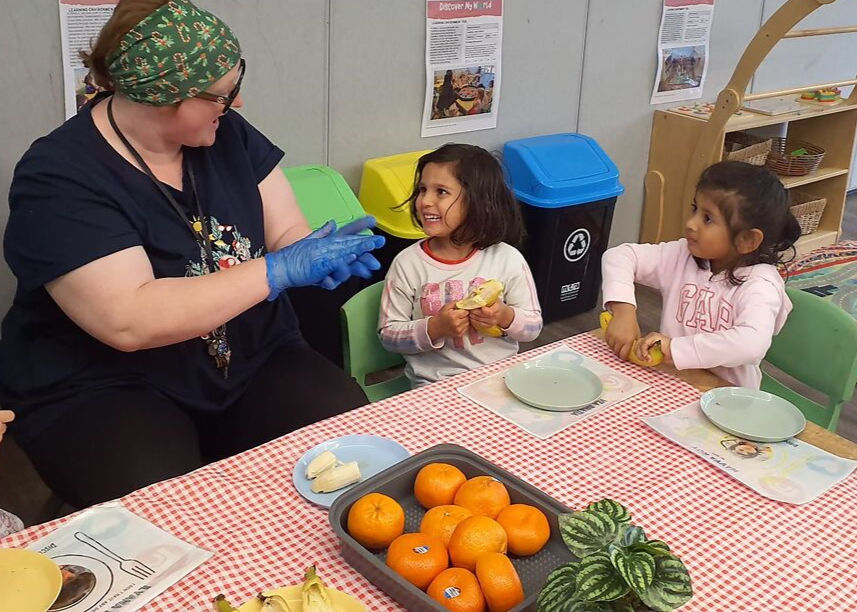Tips and Tricks for Pre-Literacy Skills at Discover My World ELC
- Discover My World

- May 19, 2025
- 3 min read

Building Strong Foundations for Literacy: Nurturing Pre-Literacy Skills in the Early Years
At Discover My World, our educational program is deeply grounded in the principles of curiosity, independence, and discovery. Aligned with the Early Years Learning Framework (EYLF), we understand that rich and meaningful language experiences are essential in laying the foundation for lifelong learning. One of the key outcomes of the EYLF is for children to become confident and effective communicators, and we embed this in our everyday practices across all age groups.
Language and literacy development are woven through our routines, play experiences, and intentional teaching moments. As educators, we’d love to share some practical strategies to help you support your child’s journey to becoming a confident communicator and early reader/writer—starting right from birth.
Why Pre-Literacy Matters
Pre-literacy skills are the early building blocks for reading, writing and language development. These include awareness of sounds (phonemic awareness), vocabulary, comprehension, print awareness, and the connection between letters and sounds. While formal reading and writing come later, the foundation is laid in the early years—often before children even pick up a pencil.
According to The Australian Government’s Raising Children Network, early literacy experiences not only influence success at school, but also shape social skills, critical thinking, independence, and lifelong learning potential.
“Children's literacy and numeracy learning begins in infancy and is critical to their success later in life” — Early Childhood Australia
Supporting Pre-Literacy Across the Ages
0–12 Months: It All Starts with Connection At this stage, literacy learning is all about connection and responsiveness. Babies communicate through coos, cries, and gestures. Our role is to respond with warmth, eye contact, and lots of conversation. Reading simple board books, singing songs, and narrating your daily activities ("Now we're putting on your socks!") builds vocabulary and teaches the rhythm and flow of language.
EYLF Connection: Outcome 5 – Children interact verbally and non-verbally with others for a range of purposes.
12–24 Months: Words Take Flight Toddlers begin to understand and use words, often stringing 2–3 together in charming combinations ("big truck go!"). Pretend play becomes a powerful tool for literacy development—especially when adults extend the play with rich language.
💡Try this: When your child is cooking in the play kitchen, you could say, “Mmm, are you making a pizza? What toppings are you using?”
EYLF Connection: Educators model and extend children’s thinking, building their understanding of language in context.
2–3 Years: Language Explosion This is a time of growing independence and problem-solving. Children’s sentences become more complex, and they begin exploring stories through imaginative play. At Discover My World, we nurture this through dramatic play spaces, group storytelling, and hands-on experiences with books and writing tools.
EYLF Connection: Outcome 5 – Children express ideas and make meaning using a range of media.
3–5 Years: Ready for Reading and Writing These preschool years are a key window for preparing children for school. At this stage, children may begin to recognise letters, write their name, retell stories, and ask “why?”—a lot! In our learning groups, we focus on phonics, letter recognition, drawing to represent thinking, and storytelling through both speaking and writing.
Activities such as name tracing, sequencing stories, and alphabet games help children understand that print carries meaning. We also encourage children to share their ideas with peers, helping them build the confidence needed to communicate clearly and creatively.
EYLF Connection: Educators provide experiences that promote literacy learning and support transitions to school.

Everyday Strategies for Families
You don’t need flashcards or expensive apps to boost your child’s literacy—just quality time and intentional moments:
Read every day – Even just 10 minutes makes a difference.
Talk and listen – Ask open-ended questions and wait for their ideas.
Play together – Pretend play boosts language, problem-solving, and social skills.
Sing and rhyme – Songs and nursery rhymes build rhythm, memory and vocabulary.
Model writing – Show them how you use writing in everyday life: notes, lists, labels.
For more support, check out trusted Australian resources:
At Discover My World, we know that literacy is more than just reading and writing—it's about communication, connection and creativity. And it all begins in the early years. Together, with families and communities, we’re nurturing confident communicators, curious thinkers and joyful learners.











Comments